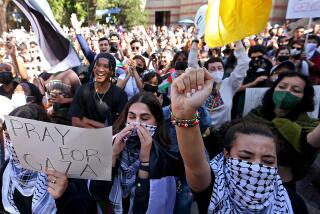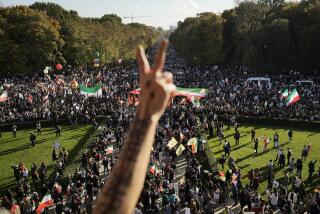Other Iraq Hot Spots May Flare
- Share via
BAGHDAD — As Iraqi commanders have deployed about 40,000 troops for a security crackdown in Baghdad, violence elsewhere has raised concern that other trouble spots have been left more vulnerable to insurgent attacks.
Assaults in Mosul during the last five days have claimed the lives of 11 people and wounded another 11. In the latest attack in the northern city, insurgents fired mortar rounds at a police station Monday, killing at least one civilian.
In nearby Tall Afar, Iraqi police shot and killed two insurgents who had attacked their compound with rocket-propelled grenades. On Sunday, five people were killed in a mortar attack in the city, including two women and two children, the U.S. military said.
In a National Assembly meeting Monday in the fortified Green Zone, Muhsin Sadoon, a Sunni Muslim from the Iraqi List electoral slate, proposed a summit between a group of tribal sheiks and representatives from the Defense and Interior ministries to discuss the security situation in Tall Afar.
After Sunni and Shiite clashes there, the city teeters on the brink of civil war, with armed militias patrolling the streets.
“I’m not very optimistic with the way things are going now,” said Khisro Jaff, a Kurdish assembly member. “We cannot talk about rebuilding or economic improvements until we control the security.”
In Mosul, residents said troops who used to patrol their streets had been sent to the capital to participate in the operation there.
“Their presence was helping us to move safely. Now our fear is growing,” said Fawaz Nagash, 28, who sells clothes in the city. “Mosul is no less important than Baghdad. It also needs sufficient security forces.”
The presence of troops, “whatever their name or shape,” is necessary, said Ethra Jabr, 33, a government official. “After we heard that the troops left, we felt more intimidated.”
But Sabir Ahmed Mohsen, a 45-year-old teacher, said the Iraqi security forces had only incited more sectarian violence between Sunnis and Shiites.
“We’ve heard a lot about torturing of clerics, especially Sunni,” he said, referring to a recent spate of killings of Shiite and Sunni religious leaders. “So we don’t miss” the forces.
Also on Monday, a suicide bomber blew himself up at a festival grounds in downtown Tikrit, wounding a young girl, Iraqi officials said.
Another suicide bomber detonated a car packed with explosives near the entrance to a police station in Baghdad’s Amil neighborhood, wounding three people. Gunmen assassinated Iraqi Army Lt. Col. Mazin Mohammed at a checkpoint in the Sheik Omar neighborhood Sunday night, Iraqi officials said.
A rash of assassinations, suicide attacks and bombings followed the announcement of a new government in late April. Insurgents have killed more than 800 people in the last month. In May, 80 American troops died, up from 52 the previous month, according to figures compiled by Associated Press. Seven U.S. troops have died in June.
Assassinations and suicide bombings appeared to have waned in the last few days as the Baghdad crackdown, known as Operation Lightning, resulted in the detention of dozens of suspects and the establishment of checkpoints across the capital. Many Iraqis fear that militants could step up attacks on less protected targets elsewhere. Insurgents stage about 70 assaults nationwide each day.
Saddam Hussein “used to bleed power from the other cities to keep Baghdad lit, and likewise in Operation Lightning,” said Wayne White, a senior analyst at the Middle East Institute in Washington. “You’re sending a signal to the insurgent to strike somewhere else, to put the knife into the weak spot.”
White said some raids are counterproductive because many people are falsely arrested. Asked whether he worried that things might get out of hand, Army Lt. Col. Steven Boylan, a U.S. military spokesman in Baghdad, said, “I’m not sure if the term ‘worried’ is right, as we continually look across the scope of operations [to] ensure we are doing what we can, where we can.”
*
Saif Rasheed, Shamil Aziz, Caesar Ahmed and Raheem Salman in The Times’ Baghdad Bureau and special correspondents in Tikrit and Mosul contributed to this report.
More to Read
Sign up for Essential California
The most important California stories and recommendations in your inbox every morning.
You may occasionally receive promotional content from the Los Angeles Times.













